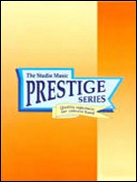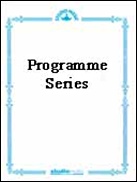Results
-
 £60.99
£60.99It Started with a Kiss Wind Band Set (Score & Parts)
This delightful ballad, in which the Alto saxophone plays a leading role, will remind many people of a very special moment in their lives. A lot could be said about it, but perhaps it is better to let the music speak for itself. While listening to this romantic ballad, unforgettable moments are sure to be relived by many people. Daydreaming is allowed, but don't forget to pay some attention to the soloist's performance - it will be worth your while. 03:30
Estimated dispatch 7-14 working days
-
 £58.95
£58.95JUBILANT CHRISTMAS, A (Concert Band) - Cacavas, John
Deck your halls with something different this year! A Jubilant Christmas uses well-known Christmas pieces and intersperses variations and bridges, to create a new kind of arrangement for the holidays. Give the gift of music this year with A Jubilant Christmas.
Estimated dispatch 7-14 working days
-
 £45.00
£45.00Love and Peace: A Father's Wish - Powell, Lane M.
A lush ballad that is an emotional tribute to fatherhood this richly scored work is suitable for both middle school and high school level bands. Featuring colorful woodwind and brass melodic lines, Love and Peace is unique in that it is a ballad that utilizes your entire percussion section! This piece contains many soaring countermelodies in the middle voices, and builds into a powerful proclamation of sonority and beauty. Perfect for festivals or concert programs.
Estimated dispatch 7-14 working days
-
 £21.95
£21.95MUSINGS ON A PHRASE (Prestige Concert Band Extra Score) - Barry, Darrol
Extra Score. Musings opens with an unaccompanied oboe presenting the main theme which is a cipher o the name Paul Hindmarsh to whom this work is dedicated. Most of the ensuing music is based on this theme in one variant or another. whilst basically a set of variations, occasionally a motif will assume more importance in the following section, the main theme never being too far away. This music goes through many mood swings but finally the opening idea reveals itself agian and fades away on piccolo and glockenspiel. Performance time: 17'03" (Recorded on Polyphonic QPRM156D DOUBLES)
Estimated dispatch 7-14 working days
-
 £107.95
£107.95MUSINGS ON A PHRASE (Prestige Concert Band Set) - Barry, Darrol
Score and Parts. Musings opens with an unaccompanied oboe presenting the main theme which is a cipher o the name Paul Hindmarsh to whom this work is dedicated. Most of the ensuing music is based on this theme in one variant or another. whilst basically a set of variations, occasionally a motif will assume more importance in the following section, the main theme never being too far away. This music goes through many mood swings but finally the opening idea reveals itself agian and fades away on piccolo and glockenspiel. Performance time: 17'03" (Recorded on Polyphonic QPRM156D DOUBLES)
Estimated dispatch 7-14 working days
-
 £24.95
£24.95NORFOLK RHAPSODY, A (Prestige Concert Band Extra Score) - Ellerby, Martin
Extra Score. Norfolk Rhapsody is a short tone poem based on an imaginary day 'somewhere in Norfolk'. Ellerby has scored the opening for recorders resulting in a mysteriously eerie atmosphere, before building into some wonderfully rhapsodic melodies showcasing all sections of the band. An unexpected use of vocals in the coda brings the piece to a poignant and blissful end. Recorded on Polyphonic QPRM157D Spirit of the Dance. Duration 10'00"
Estimated dispatch 7-14 working days
-
 £124.95
£124.95NORFOLK RHAPSODY, A (Prestige Concert Band Set) - Ellerby, Martin
Score and Parts. Norfolk Rhapsody is a short tone poem based on an imaginary day 'somewhere in Norfolk'. Ellerby has scored the opening for recorders resulting in a mysteriously eerie atmosphere, before building into some wonderfully rhapsodic melodies showcasing all sections of the band. An unexpected use of vocals in the coda brings the piece to a poignant and blissful end. Recorded on Polyphonic QPRM157D Spirit of the Dance. Duration 10'00"
Estimated dispatch 7-14 working days
-
 £41.58
£41.58Peace Like A River (Concert Band - Score and Parts)
A beautiful setting based upon the traditional African-American spiritual, "Peace Like A River" is extremely musical using only the first six notes introduced in most beginning band methods. Lyrical, flowing and musically engaging, this is beginning band literature that will make a difference in your teaching and concert performances.
Estimated dispatch 7-14 working days
-
 £49.95
£49.95SPECIAL PLACE, A (Programme Concert Band) - Richards, Goff
A Special Place was composed and dedicated to 'The Children's Hospice South West' - a charity founded to aid children with life-limiting or life-threatening conditions, and to give support to their families. The original version for brass band has helped to raise funds for this good cause, and the Bristol Concert Wind Band Associations, with the same aims, commissioned this wind band edition. The melody and arrangement is Goff Richards at his best and is a real audience winner.
Estimated dispatch 7-14 working days
-
 £90.00
£90.00STEPHEN FOSTER SETT, A (Concert Band) - Foster, Stephen C. - Hunsberger, Donald
A Stephen Foster Sett was created to provide settings of three differing styles of Foster's music: parlour music - Come Where My Love Lies Dreamin," theatrical music - I Dream of Jeanie with the Light Brown Hair and work songs - The Glendy Burk. The accompaniment for Come Where My Love... is scored for a small chamber ensemble, Jeanie.. for an expandable chamber orchestra and Glendy Burk for a Civil War era brass band
Estimated dispatch 7-14 working days
